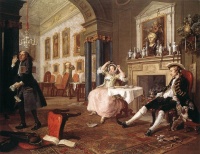Series
From The Art and Popular Culture Encyclopedia
(Difference between revisions)
| Revision as of 23:19, 12 December 2009 Jahsonic (Talk | contribs) ← Previous diff |
Current revision Jahsonic (Talk | contribs) |
||
| Line 1: | Line 1: | ||
| + | {| class="toccolours" style="float: left; margin-left: 1em; margin-right: 2em; font-size: 85%; background:#c6dbf7; color:black; width:30em; max-width: 40%;" cellspacing="5" | ||
| + | | style="text-align: left;" | | ||
| + | "In [[French literature]], [[Honoré de Balzac]]'s ambitious ''[[La Comédie humaine]]'' (a set of nearly 100 novels and plays, with some recurring characters) started to come together during the 1830s. [[Émile Zola]]'s ''[[Les Rougon-Macquart|Rougon-Macquart]]'' cycle is a [[family saga]], a format that later became a popular fictional form, going beyond the conventional [[three-volume novel]]."--Sholem Stein | ||
| + | |}[[Image:Hogarth Marriage.jpg|thumb|200px|''[[Marriage à-la-mode: 2. The Tête à Tête]]'' (1743) by William Hogarth]] | ||
| {{Template}} | {{Template}} | ||
| - | ''[[Les sérées]]'' (1584, 97, 98) is a series of jokes by [[Guillaume Bouchet]] | + | A '''series''' is a [[number]] of [[thing]]s that [[follow]] on one after the [[other]] or are [[connected]] one after the other. |
| - | :"He wrote the [[Series]], fifty gallant "jokes" which have the effect of well-told anecdotes in their pregnant setting. One reads here of the lady who has to sit on the pot de chambre and gets pinched in her private parts by a crayfish; of the dreamer who dreams of gold but who receives turds; of the cuckolded husband who must get into the privy at once but who cannot open the door because his wife and her lover are having a very important conference there. Whereas the stories of the [[Heptameron]] and the [[Nouvelles Recreations]] still contain much that is superfluous, the tendency toward the pure form of the anecdote appears ever more clearly in the last decades of the 16th century, to assume final form in the work of Bouchet and [[Beroalde de Verville]]. In these anecdotes of the Series, and of the [[Moyen de parvenir]] soon to be discussed, with their condensation and pointedness, the material of the old French fabliaux assumed the form of the modern French conte." | + | It may refer to: |
| - | A few illustrations will prove this. | + | ==Arts, entertainment, and media== |
| - | A pregnant woman feels that her hour is due. The midwife | + | ===Music=== |
| - | supports her and desires to put her upon the bed. Whereupon | + | * Series, the ordered [[Set (music)|sets]] used in serialism including tone rows |
| - | she cries: "No, not on the bed; that's where I met my misfor- | + | * [[Harmonic series (music)]] |
| - | tune." | + | * [[Serialism]], including the twelve-tone technique |
| - | A group was conversing about the slightness of hand found | + | ===Types of series in arts, entertainment, and media=== |
| - | among gypsies, and one man related how they took a stone, en- | + | * [[Book series]] |
| - | closed it in their fist in the sight of all, and were so skilled in | + | * [[Film series]] |
| - | making it disappear that no one could tell whether it was still | + | * [[Television series]] |
| - | there or not. His wife who had not been listening very atten- | + | |
| - | tively remarked, quite naively: "Tush, that can't be so difficult. | + | |
| - | I always know whether it is inside or not." | + | |
| - | f A newly married couple had just gone to bed and the hus- | + | ==See also== |
| - | band was praising his wife for her chastity during their be- | + | * [[Serial (literature)]] |
| - | trothal — that is, for not having granted him that which he had | + | * [[Serial (radio and television)]] |
| - | been so fervently desiring. Thereupon she said to him, "Yes, | + | |
| - | dear, I took great care not to let myself go in spite of the fact | + | |
| - | that I desired you, because I had already been deceived too | + | |
| - | many times in such matters." | + | |
| {{GFDL}} | {{GFDL}} | ||
Current revision
|
"In French literature, Honoré de Balzac's ambitious La Comédie humaine (a set of nearly 100 novels and plays, with some recurring characters) started to come together during the 1830s. Émile Zola's Rougon-Macquart cycle is a family saga, a format that later became a popular fictional form, going beyond the conventional three-volume novel."--Sholem Stein |

Marriage à-la-mode: 2. The Tête à Tête (1743) by William Hogarth
|
Related e |
|
Featured: |
A series is a number of things that follow on one after the other or are connected one after the other.
It may refer to:
Contents |
[edit]
Arts, entertainment, and media
[edit]
Music
- Series, the ordered sets used in serialism including tone rows
- Harmonic series (music)
- Serialism, including the twelve-tone technique
[edit]
Types of series in arts, entertainment, and media
[edit]
See also
Unless indicated otherwise, the text in this article is either based on Wikipedia article "Series" or another language Wikipedia page thereof used under the terms of the GNU Free Documentation License; or on research by Jahsonic and friends. See Art and Popular Culture's copyright notice.

